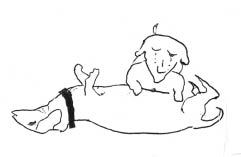Anthropomorphism and a weird, astringent sense of humour combined to make The Queue, the late Jonathan Barrow’s only novel, a work of genius in the opinion of his brother Andrew.
Anthropomorphism and a weird, astringent sense of humour combined to make The Queue, the late Jonathan Barrow’s only novel, a work of genius in the opinion of his brother Andrew. The typescript he inherited, though ‘unedited, repetitious and often excessively scatological’, he writes, ‘appealed to me immediately . . . I found it screamingly funny.’ In this affectionate expression of sibling adulation, he describes Jonathan’s style as ‘part journalese, part satire, part Beatrix Potter, part Marquis de Sade’. Jonathan wrote about animals, birds and fish as if they were human, implicitly deriding the absurd illogicality of human social behaviour. A less sympathetically prejudiced reader, in an apt summing-up, has described The Queue as ‘surrealist whimsy’.
Jonathan was born in Lancaster in 1947, the youngest of five sons of a senior legal civil servant, eventually a Treasury prosecutor, with a home in Turleigh Combe, Wiltshire, and a flat in Holland Park. Andrew, the fourth son, only 18 months older than Jonathan, shared his creative ambitions but was not equally imaginatively preposterous, and apparently felt like a rather inferior twin.
In late childhood, both of them, Andrew recalls, were
beginning to become acutely class-conscious – partly the effect of being at the fundamentally middle-class Clifton and then at posh semi-upper-class Harrow, and partly the effect of our father’s multiple snobberies.We both had an oversimplified view of toffs and grand country life, as witnessed at a distance in Wiltshire, Savile Row tailoring and the typical Harrovian’s respect for and fear of Etonians.
Their scholastic careers were undistinguished, so they did not attempt to follow their three senior brothers into profitable conventional pursuits.
Jonathan and Andrew at first aspired to the glamour of show business. Andrew soon discovered how difficult it is to succeed as a stand-up comedian and how embarrassing it is to fail. Jonathan was quicker to give up. He went to work in the kitchens of Claridge’s and the Savoy, became a good cook and was entranced by the clientele of fashionable hotels. His vivacity and charm enabled him to penetrate the society of debutantes and their elders. However, his principal interest was in writing and drawing. Andrew also wrote then and ever after. He has successfully published eight books before this one.
When young, like some other unpublished novelists, they drifted into advertising, Jonathan characteristically into the trade’s smartest two agencies, Ogilvy & Mather and J. Walter Thompson, fragrant with the ethos of Madison Avenue and Mayfair, Andrew into an agency somewhat less smart. Meanwhile, with Andrew’s help, Jonathan submitted stories and drawings to acquaintances who were variously authoritative in publishing and the arts. Undeterred by some crushing responses (one leading London literary agent said, ‘repulsive and boring’), he managed to place two stories in the London Magazine , and, then under the influence of Jackson Pollock, sold two drawings through the Redfern Gallery. Many of his more easily comprehensible drawings, ingratiatingly sub-Thurber, decorate the pages of Animal Magic. The best of them were inspired by Gilda, a family pet Jonathan described as ‘a bad, fat, greedy dachshund,’ the spiritual heroine of The Queue.
The novel was not accepted for publication until immediately after Jonathan and his fiancée died in a car crash, in 1970, and has long been out of print. In it, he wrote of a wedding that turned into a funeral, foreseeing their own coffins being carried into Brompton Oratory when their wedding guests were waiting there. Lengthy quotations from The Queue profusely intersperse the text of Andrew’s biographical tribute, like commercials. A republication is planned.





Comments